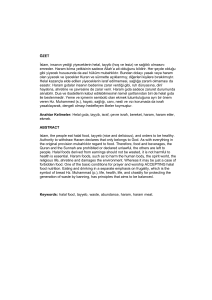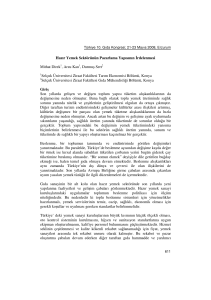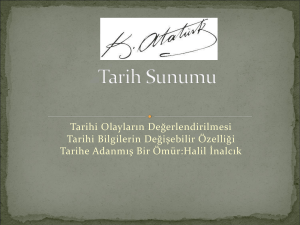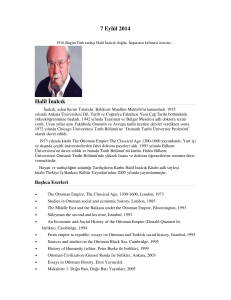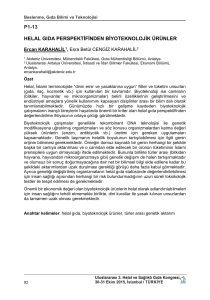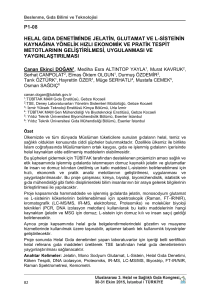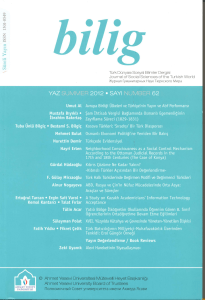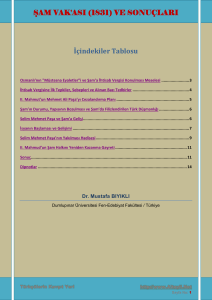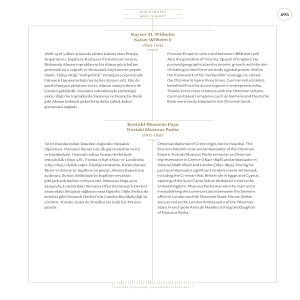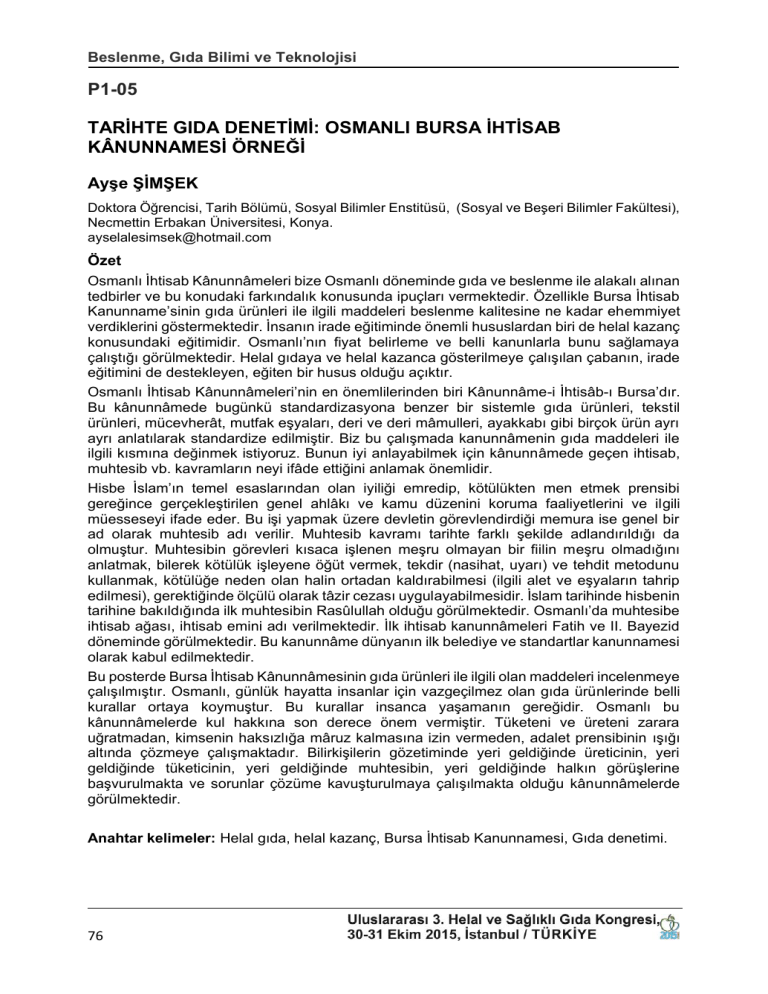
Beslenme, Gıda Bilimi ve Teknolojisi
P1-05
TARİHTE GIDA DENETİMİ: OSMANLI BURSA İHTİSAB
KÂNUNNAMESİ ÖRNEĞİ
Ayşe ŞİMŞEK
Doktora Öğrencisi, Tarih Bölümü, Sosyal Bilimler Enstitüsü, (Sosyal ve Beşeri Bilimler Fakültesi),
Necmettin Erbakan Üniversitesi, Konya.
ayselalesimsek@hotmail.com
Özet
Osmanlı İhtisab Kânunnâmeleri bize Osmanlı döneminde gıda ve beslenme ile alakalı alınan
tedbirler ve bu konudaki farkındalık konusunda ipuçları vermektedir. Özellikle Bursa İhtisab
Kanunname’sinin gıda ürünleri ile ilgili maddeleri beslenme kalitesine ne kadar ehemmiyet
verdiklerini göstermektedir. İnsanın irade eğitiminde önemli hususlardan biri de helal kazanç
konusundaki eğitimidir. Osmanlı’nın fiyat belirleme ve belli kanunlarla bunu sağlamaya
çalıştığı görülmektedir. Helal gıdaya ve helal kazanca gösterilmeye çalışılan çabanın, irade
eğitimini de destekleyen, eğiten bir husus olduğu açıktır.
Osmanlı İhtisab Kânunnâmeleri’nin en önemlilerinden biri Kânunnâme-i İhtisâb-ı Bursa’dır.
Bu kânunnâmede bugünkü standardizasyona benzer bir sistemle gıda ürünleri, tekstil
ürünleri, mücevherât, mutfak eşyaları, deri ve deri mâmulleri, ayakkabı gibi birçok ürün ayrı
ayrı anlatılarak standardize edilmiştir. Biz bu çalışmada kanunnâmenin gıda maddeleri ile
ilgili kısmına değinmek istiyoruz. Bunun iyi anlayabilmek için kânunnâmede geçen ihtisab,
muhtesib vb. kavramların neyi ifâde ettiğini anlamak önemlidir.
Hisbe İslam’ın temel esaslarından olan iyiliği emredip, kötülükten men etmek prensibi
gereğince gerçekleştirilen genel ahlâkı ve kamu düzenini koruma faaliyetlerini ve ilgili
müesseseyi ifade eder. Bu işi yapmak üzere devletin görevlendirdiği memura ise genel bir
ad olarak muhtesib adı verilir. Muhtesib kavramı tarihte farklı şekilde adlandırıldığı da
olmuştur. Muhtesibin görevleri kısaca işlenen meşru olmayan bir fiilin meşru olmadığını
anlatmak, bilerek kötülük işleyene öğüt vermek, tekdir (nasihat, uyarı) ve tehdit metodunu
kullanmak, kötülüğe neden olan halin ortadan kaldırabilmesi (ilgili alet ve eşyaların tahrip
edilmesi), gerektiğinde ölçülü olarak tâzir cezası uygulayabilmesidir. İslam tarihinde hisbenin
tarihine bakıldığında ilk muhtesibin Rasûlullah olduğu görülmektedir. Osmanlı’da muhtesibe
ihtisab ağası, ihtisab emini adı verilmektedir. İlk ihtisab kanunnâmeleri Fatih ve II. Bayezid
döneminde görülmektedir. Bu kanunnâme dünyanın ilk belediye ve standartlar kanunnamesi
olarak kabul edilmektedir.
Bu posterde Bursa İhtisab Kânunnâmesinin gıda ürünleri ile ilgili olan maddeleri incelenmeye
çalışılmıştır. Osmanlı, günlük hayatta insanlar için vazgeçilmez olan gıda ürünlerinde belli
kurallar ortaya koymuştur. Bu kurallar insanca yaşamanın gereğidir. Osmanlı bu
kânunnâmelerde kul hakkına son derece önem vermiştir. Tüketeni ve üreteni zarara
uğratmadan, kimsenin haksızlığa mâruz kalmasına izin vermeden, adalet prensibinin ışığı
altında çözmeye çalışmaktadır. Bilirkişilerin gözetiminde yeri geldiğinde üreticinin, yeri
geldiğinde tüketicinin, yeri geldiğinde muhtesibin, yeri geldiğinde halkın görüşlerine
başvurulmakta ve sorunlar çözüme kavuşturulmaya çalışılmakta olduğu kânunnâmelerde
görülmektedir.
Anahtar kelimeler: Helal gıda, helal kazanç, Bursa İhtisab Kanunnamesi, Gıda denetimi.
76
Nutrition, Food Science and Technology
P1-05
FOOD CONTROL IN HISTORY: THE EXAMPLE OF OTTOMAN
“IHTISAB” CODE OF BURSA
Ayse SIMSEK
Phd student, Department of History, Institute of Social Sciences (Faculty of Social Sciences and
Humaties), Necmettin Erbakan University, Konya.
ayselalesimsek@hotmail.com.
Abstract
The Ottoman Ihtisab Codes give us some tips on food and nutrition during the Ottoman
period, and awareness on this subject. Especially the articles on food products of Bursa
İhtisab Code have given how important the quality of nutrition is. One of the important
points in the human’s education of will is the education of halal earnings. The Ottoman
Empire was trying to achieve it by issuing some laws and determining the prices. It is
clear that the effort to halal food and halal earnings in Ottoman was also support
education of the will.
Bursa İhtisab Code is one of the most important Codes in Ottoman. This Code is similar
to the current standardization. Many products are standardized in this Law. In this study,
we would like to mention the part about the food described in the code of law. İt is
important to understand the meaning of muhtasib, ihtisab, hisba for code of laws in
Bursa.
Hisba is an organization contains the basic principles of Islam like the protection of
public order and general moral. One of the principles is that “ordering the good and
forbidding the evil.” The state employed to make this task officer named as muhtasib.
This concept in history has been named in different ways. Muhtasib’s duties are as
follows: Tell that to an action is not correct, to advise those who knowingly commit evil,
use the method of advice, warn and threat, remove the condition that causes evil, to
apply punishment when necessary (limited punishment). When we look at the history of
Islam and hisba it is seen as the first muhtasib is the Prophet Muhammed. In the
Ottoman Empire muhtasib is called “İhtisab Agasi” and “İhtisab Emini”. First ihtisab
(penalty) code of laws is seen in the time of Fatih Sultan Mehmet and then Bayezid II.
Ottoman, in this Code, has given utmost importance about human rights. Ottoman tried
to solve the problems on trial under the light of the principle of Justice.
This poster has been viewed substances related to food products of Bursa Ihtisab Code.
Ottoman revealed certain rules in food products which are indispensable for people in
daily life. These rules are a requirement of human life. The Ottomans gave utmost
importance to human rights in these Codes. They try to solve problems in the light of
the principle justice without causing damage for consumer and producer. They were
resorting to public opinion when appropriate, to the manufacturers, the consumer and
muhtasib under the supervision of experts. Ottoman code of laws tries to solve the
problem with such methods.
Keywords: Halal food, Halal earnings, Bursa Ihtisab Code, food control.
77

